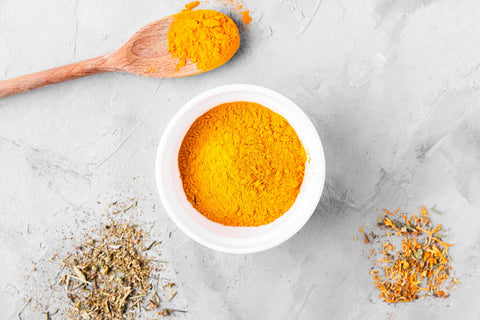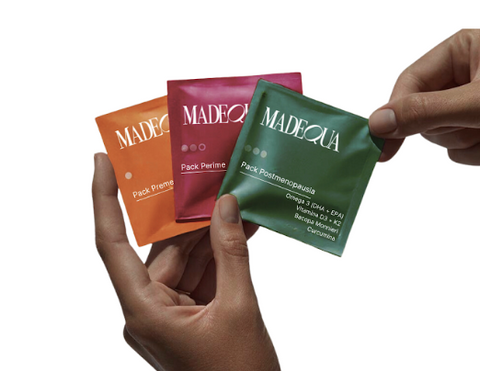Turmeric (Curcuma longa) is a plant from the ginger family whose fresh, grated or powdered rhizomes or roots are used as a spice in cooking. It is native to Asia, where it is widely used in all kinds of preparations. It is also called Indian saffron,
Its flavour, when used in small quantities, is very mild and barely noticeable. It has aromas similar to mustard and black pepper, although it is not spicy. It is known that 4000 years ago it was already used in India, in the Vedic culture, as a spice and as a medicine.
The color is due to its curcumin content , a yellow chemical produced by the plant and widely used in the food industry as a colorant, under the name E-100. It is a main ingredient in curry powder.
Today, its use is widespread throughout the world and we can find turmeric powder in any supermarket, at the same price as other spices and herbs.
What are the benefits of turmeric?
The properties and benefits of turmeric have been studied for a long time and there are numerous studies that support them. We summarize the main ones:
- It is a natural anti-inflammatory : It can be useful for women in menopause , since during this stage it is very common to suffer from low-grade inflammation. Or to relieve menstrual pain or pain derived from arthritis or rheumatism, cases in which there is a situation of underlying inflammation.
- Relieves stomach pain and gas : Used in moderation, turmeric helps digestion and prevents flatulence, as it promotes stomach secretions and intestinal motility.
- It can help our immune system : Turmeric is a natural antiviral, antibacterial and antifungal, making it ideal for strengthening low defenses.
- Protects against heart disease : its consumption improves the absorption of fats by our body, which helps us reduce bad cholesterol and triglycerides, the main risk factors for cardiovascular diseases.
- It fights aging and can help prevent certain types of cancer : this spice is a powerful antioxidant that fights free radicals, responsible for the aging of our cells. Therefore, turmeric consumption is recommended to prevent the appearance of some cancers such as colon, skin, breast or duodenal cancer.
- Treats depression and stimulates memory : Turmeric is a great ally for our brain because it acts on our nervous system, stimulating its functioning and the production of serotonin. Therefore, it can have very positive effects on clinical symptoms of depression, in addition to preventing neurodegenerative diseases such as Alzheimer's .
How can we use turmeric in cooking?
Turmeric is a very interesting spice and is used:
As a colorant
In paellas and other rice dishes that require yellow food coloring or saffron, you can use turmeric instead of coloring in the same amount. Since it is very little, it hardly adds any flavor, but it does dye our preparations yellow.
It is also used in stews, soups, purees, pastas, muffins, cookies, etc.
As a spice
Many Asian recipes use turmeric as a spice, both fresh and powdered, and in both sweet and savory dishes, as it tastes neither salty nor sweet.
You can find fresh turmeric in Asian and some other supermarkets. It looks a lot like ginger, but it is smaller and orange in color.
It is widely used in Indian cuisine and is one of the bases of its flavours and colours. It is used in most dishes and is one of the essential ingredients in curry.
Whole, ground, with milk, with cocoa, with yogurt... This spice can be used in many ways and combinations.
Here we leave you two delicious recipes with turmeric.
Golden milk
It is a vegetable drink that we make with coconut milk and turmeric, and it is an excellent alternative to cow's milk, much more digestive and detoxifying.
It can also be a better option than coffee for getting energy. It also provides us with a large amount of minerals and helps us strengthen the immune system.
Ingredients:
1 glass of coconut milk (200 ml)
1 teaspoon turmeric powder (4 g)
Honey or stevia (to taste)
Preparation:
To make golden milk we only have to boil the coconut milk with the turmeric for 5 minutes.
Then sweeten to taste and drink, if you wish, leave it in the refrigerator until it is cold...delicious!
Aromatic turmeric infusion
Turmeric can be one of the key ingredients when preparing an aromatic infusion with digestive properties. If we drink it hot it comforts and relaxes us, while cold it can be a refreshing and delicious drink to have during the day.
Ingredients:
4 cups of water (1 liter)
1 teaspoon turmeric powder (4 g)
1 teaspoon of cinnamon powder (4 g)
1 teaspoon of ginger powder (4 g)
1 teaspoon anise seeds (4 g)
1 teaspoon cardamom seeds (5 g)
Preparation:
To start, we will boil the water and add the anise and cardamom seeds.
We will let it boil for 10 minutes.
Next, we will turn off the heat and add the turmeric, cinnamon and ginger powder.
We will cover the casserole and let it rest for 10 minutes.
Finally, sweeten to taste, if desired, and drink.
What options do we have if we are not convinced by the taste of turmeric?
It is often not easy to get used to the peculiar taste of turmeric, but don't worry because there are other options such as Madequa's 100% natural supplements. Like the Protection Pack , which contains curcumin among other 100% natural ingredients. At optimal and effective doses, scientifically proven. This pack contains 30 daily sachets with natural pills for menopause that contain Omega 3 , Vitamin D, Vitamin K , Curcumin and Bacopa Monnieri.
It has numerous benefits that are not only focused on treating a single symptom but also on helping you achieve comprehensive well-being. Among its benefits are: Improved memory and concentration; Promote metabolic and cardiovascular health; Protect joint health; Anti-inflammatory and antioxidant effect; Provide energy and vitality.
Madequa also offers other packs tailored to the specific needs of each stage of menopause, understanding the changing needs of women at each stage. If you don't know what stage of menopause you are in, you can take our test to find out .
With Madequa you can live a fuller, healthier and more balanced life, accompanied by a healthy lifestyle.
References
Thavorn K, Mamdani MM, Straus SE. Efficacy of turmeric in the treatment of digestive disorders: a systematic review and meta-analysis protocol. Syst Rev 2014;3:71. doi:10.1186/2046-4053-3-71.
Zhang P, Liu H, Yu Y, Peng S, Zhu S. Role of Curcuma longae Rhizoma in medical applications: research challenges and opportunities. Front Pharmacol. 2024;15:1430284. doi: 10.3389/fphar.2024.1430284. Dehzad MJ, Ghalandari H, Nouri M, Askarpour M.
Antioxidant and anti-inflammatory effects of curcumin/turmeric supplementation in adults: A GRADE-assessed systematic review and dose-response meta-analysis of randomized controlled trials. Cytokine. 2023;164:156144. doi: 10.1016/j.cyto.2023.156144.
Bhat A, Mahalakshmi AM, Ray B, Tuladhar S, Hediyal TA, Manthiannem E, Padamati J, Chandra R, Chidambaram SB, Sakharkar MK. Benefits of curcumin in brain disorders. Biofactors. 2019;45(5):666-689. doi: 10.1002/biof.1533.
Micucci M, Aldini R, Cevenini M, Colliva C, Spinozzi S, Roda G, Montagnani M, Camborata C, Camarda L, Chiarini A, Mazzella G, Budriesi R. Curcuma longa L. as a therapeutic agent in intestinal motility disorders. 2: Safety profile in mouse. PLoS One. 2013;8(11):e80925. doi: 10.1371/journal.pone.0080925
Allegra A, Mirabile G, Ettari R, Pioggia G, Gangemi S. The Impact of Curcumin on Immune Response: An Immunomodulatory Strategy to Treat Sepsis. Int J Mol Sci. 2022;23(23):14710. doi:10.3390/ijms232314710
Baratzadeh F, Butler AE, Kesharwani P, Moallem SA, Sahebkar A. Effects of curcumin on low-density lipoprotein oxidation: From experimental studies to clinical practice. EXCLI J. 2022;21:840-851. doi: 10.17179/excli2022-4878.
Golmohammadi M, Zamanian MY, Al-Ani AM, Jabbar TL, Kareem AK, Aghaei ZH, Tahernia H, Hjazi A, Jissir SA, Hakimizadeh E. Targeting STAT3 signaling pathway by curcumin and its analogues for breast cancer: A narrative review. Animal Model Exp Med. 2024. doi: 10.1002/ame2.12491.




Comments (0)
There are no comments for this article. Be the first one to leave a message!